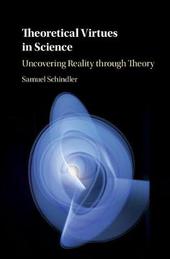
|
Theoretical Virtues in Science: Uncovering Reality through Theory
Hardback
Main Details
| Title |
Theoretical Virtues in Science: Uncovering Reality through Theory
|
| Authors and Contributors |
By (author) Samuel Schindler
|
| Physical Properties |
| Format:Hardback | | Pages:260 | | Dimensions(mm): Height 234,Width 155 |
|
| Category/Genre | Philosophy of science |
|---|
| ISBN/Barcode |
9781108422260
|
| Classifications | Dewey:501 |
|---|
| Audience | | Professional & Vocational | |
|---|
| Illustrations |
Worked examples or Exercises; 10 Line drawings, black and white
|
|
Publishing Details |
| Publisher |
Cambridge University Press
|
| Imprint |
Cambridge University Press
|
| Publication Date |
24 May 2018 |
| Publication Country |
United Kingdom
|
Description
What are the features of a good scientific theory? Samuel Schindler's book revisits this classical question in the philosophy of science and develops new answers to it. Theoretical virtues matter not only for choosing theories 'to work with', but also for what we are justified in believing: only if the theories we possess are good ones (qua virtues) can we be confident that our theories' claims about nature are actually correct. Recent debates have focussed rather narrowly on a theory's capacity to predict new phenomena successfully, but Schindler argues that the justification for this focus is thin. He discusses several other theory properties such as testability, accuracy, and consistency, and highlights the importance of simplicity and coherence. Using detailed historical case studies and careful philosophical analysis, Schindler challenges the received view of theoretical virtues and advances arguments for the view that science uncovers reality through theory.
Author Biography
Samuel Schindler is Associate Professor in the Centre for Science Studies at Aarhus University, Denmark. He has published his work in journals such as The British Journal in Philosophy of Science, Synthese, and Studies in the History and Philosophy of Science. He has received two major external grants from national research foundations in Germany and Denmark.
Reviews'In this ambitious book Samuel Schindler mounts a sustained defence of scientific realism, challenging the most important antirealist arguments with a comprehensive and multi-layered appeal to theoretical virtues. His advocacy for the general truth-conduciveness of these virtues, rejecting the lure of predictivism, is both balanced and persuasive.' Hasok Chang, University of Cambridge 'Steeped in the history of science and bursting with examples, this book turns a spotlight on the 'theoretical virtues' and their role in determining what the natural sciences reveal about our world. Fearlessly contesting received views of the import of novel predictions and the nature of ad hoc hypotheses, Schindler shows by example how general philosophy of science, and the history and philosophy of science, are indispensable to an understanding of scientific knowledge.' Anjan Chakravartty, University of Notre Dame, Indiana 'The book is clearly written, well-informed about both philosophy and history of science, and makes numerous incisive points. I would recommend this as an excellent guide to the literature, due to its clear overarching narrative thread, and the fact that Schindler is not afraid to point out various oddities and sources of confusion in the literature.' Darren Bradley, Metascience
|